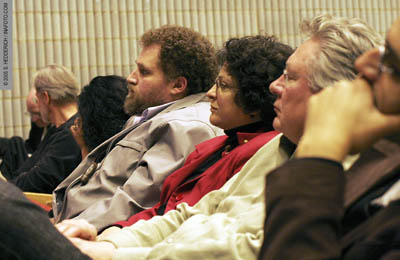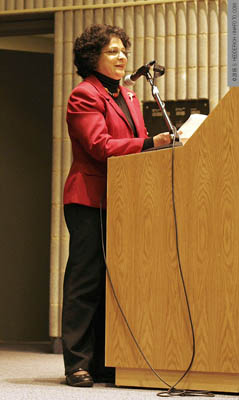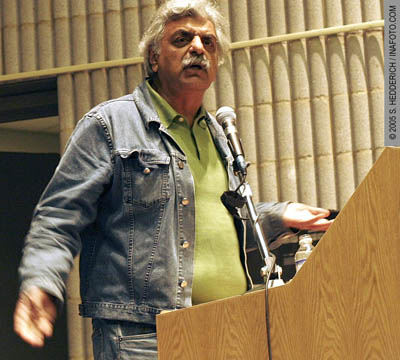What binds Canada, Venezuela, Iraq and Pakistan?
BY Sydney Hedderich
TORONTO -- "Resist US Hegemony: Venezuela, Iraq, Pakistan." So announced a symposium sponsored by the Muslim Canadian Congress on April 30, 2005. Among the keynote speakers were Tariq Ali, a London-based radical activist, author and journalist from Pakistan; Leo Panitch, a Toronto-based political science professor, Marxist theorist and editor of the Socialist Register; and María Páez Victor, a Venezuelan-born, Toronto-based university instructor, consultant and Hugo Chávez apologist.

Held at the Medical Sciences Building of the University of Toronto, the event was attended by nearly 500 at $10.00 per person. Outside the venue, vendors and distributors hawked newspapers and flyers on Marxism and anti-imperialism. While inside, a bust of ancient Hippocrates watched over the promoters of revolutionary art, pamphlets, and books for sale. Among these books were those of Tariq Ali, the keynote speaker.
Moderating the event was author Varda Burstyn who substituted for Judy Rebick, an author, journalist and media personality. Ms Burstyn introduced the Muslim Canadian Congress by summarizing what it represented. Tolerance and diversity are key elements among the secular members of this small group whose informal motto is: "Size doesn't matter" (rippled laughter from the audience)..
Contrary to the diversity proclaimed, however, the programming for the evening did not seem very tolerant of other points of view.

María Páez Victor was the first speaker. She expressed the one thousand wonders of president Chávez of Venezuela. And she denied the many negative aspects of his administration, stating at one point: "You will hear that there are political prisoners in Venezuela. There are not." Her many praises of the Chávez government provoked one member of the audience to mutter expletives. It was a Muslim leftist who later explained: "no government is that perfect". And he is right. For contrary to the efforts of revolutionaries and lobbyists who are paid by the Venezuelan government to improve international opinion of the Chávez regime, there are indeed political prisoners in Venezuela. The list of political prisoners in Venezuela has grown much longer since Páez Victor's earlier denial (CERLAC, York University-Toronto, February 2003). So why the cover up when the facts can easily be gleaned from Human Rights Watch - Venezuela, or from Vcrisis.com?
Páez Victor avoided mentioning other critical issues of the Chávez regime. These include: disrespect for the rule of law, lack of government transparency, consolidation of power, a loading of the judiciary, and legislation that makes it a crime to offend the President, including by Internet. More tellingly, Páez Victor failed to mention the increase in poverty in Venezuela over the past five years. This, in spite of lip service to the contrary from the Chávez regime, higher prices of oil, and an increase in allowable foreign investment. Where has the money gone? Páez Victor sidestepped these sticky issues, omitting mention of the government's own National Institute of Statistics, which proves the rise in poverty levels. In fact, Chávez himself admitted to this negative state of affairs in his televised weekly program of forced broadcasting, Aló Presidente (Number 217). But true to style, he rationalized that the statistics were "neo-liberal, capitalist instruments to measure the reality of the revolution". Right. Numbers and the economics that produce them can be so darn pesky.
Ms. Páez Victor did not acknowledge the social polarization that has become a hallmark of the Chávez presidency - after he was democratically elected in 1999. Nor did she recognize the political apartheid that Chávez has ushered in to destabilize the social fabric, amass power, and affect the working lives of thousands of Venezuelans.
Páez Victor also omitted mention of the list of citizens who signed for a constitutionally allowed referendum, then voted in the national referendum against president Chávez. Through this list, the government not only disrespected the confidentiality of signatures and the secrecy of the vote, but also decided whom to hire, whom to fire, who would receive benefits, who would get a government contract, and who would receive a passport or government identity card.
Widely rumoured to exist, the list was masterminded by Luis Tascón, a representative of the official government party (MVR). Chávez confirmed its existence during another one of his televised Aló Presidente's when he cynically stated: "it is now time to bury the Tascón list... it has achieved its purpose."
Why did Páez Victor omit critical facts? What else might she be hiding from audiences?
As for personal notes, Paéz Victor mentioned having left Venezuela when she was very young because she did not agree with the frivolity of many aspects of Venezuelan society during previous governments. To be sure, it is a lovely story for revolutionary street credentials. But given a near unaccented English, could Mummy and Daddy Páez have sent their daughter to study abroad at an early age?
The next speakers included: Leo Panitch, a professor of political science at York University who attempted to invigorate the audience with revolutionary speak and new peppered 'isms'; a Muslim vice-principal of a Toronto school who spoke on the rights of women in Muslim society; and Jehad Aliweiwi, a founding member of the Muslim Canadian Congress who described the organization before inviting the guest of honour to speak.

With fire and brimstone, the anti-capitalist dissenter Tariq Ali electrified the audience on issues related to the Middle East. And he addressed the hatred that he has for the United States of America. That is, when the U.S. is not providing Ali with the opportunity of a promotional two-week book tour. Large, capitalist markets can be so irresistible to the radical chic set.
Ali's hatred towards the U. S. perfectly segued into his discussion on Hugo Chávez of Venezuela, a kindred spirit. Chávez, who periodically announces his imminent assassination, never misses an opportunity to denounce the U. S. That is, when he fails to mind the store, or is busy making friends with marginalized leaders, such as "his brother" Robert Mugabe of Zimbabwe.
Ali mentioned a conversation he had with Chávez when he asked the president of Venezuela if he was afraid during the 2002 coup against him. Chávez, who himself led a failed coup against a democratically elected president in 1992, replied: "No, because I knew the military would protect me". But Chávez did admit to being fearful during the massive work stoppage that followed a number of months later.
Omitting that the stoppage was worker-led, Ali continued to weave his tale. Chávez confided in him that at the time there was no beer to be had - an explosive situation for the nation. In the ensuing chaos, Chávez left the presidential palace to walk about the shantytowns, finding a mother who invited him to her shack. There the woman showed the president how she was coping without gas to cook meals for her family. She had sawed off the legs of her bed to use for firewood. And she told Chávez that 'tomorrow, I'll use the headboard', begging her guest not to leave the presidency. And president Chávez, now in his seventh year, did not.
Ali also mentioned that one has to live in a place to truly know it. But what Ali failed to declare when he was passionately expounding on the Middle East is that he lives far from the region he discusses, in his case, London, England.
Likewise María Páez Victor. Teaching a course in Sociology of Health and Medicine at the University of Toronto, Páez Victor promotes the Chávez government through several mechanisms. She speaks as though she has lived the Bolivarian reality of Venezuela. But her experience is chiefly by proxy, and through her direct involvement in the Toronto-based Bolivarian Circle of Louis Riel.
What is a Bolivarian Circle? Outwardly, it is a group formed to improve aspects of a given community. Behind the scenes is a modus operandi that is more saturated in politics than in sociology. Essentially, a Bolivarian Circle is a vehicle used to promote Chávez' revolutionary ideas; it is loosely based on the Committees for the Defense of the Revolution - neighbourhood watch groups implemented by the Castro regime throughout Cuba.
Interestingly, many mercenaries of the left have received highly polished educations outside the regions they defend. They live comfortably abroad, unlike those whose rights they champion. And they know how promote themselves by marketing their ideas. They seek enemies to consolidate their platform. And they avoid admitting to the causes of nationally produced miseries, blaming scapegoats instead.
As they rattle sabers and promote the gospel of envy and resentment, these revolutionaries throw their darts at the capitalist world while enjoying its perks. And they seek shared platforms to magnify the effects of their message.
Case in point: In November 2004, a circular from the Venezuelan government ("Bolivarian Revolution: The New Stage") spelled out the tools needed to optimize communications, nationally and abroad. The strategy called for groups of opinion makers, communication specialists and intellectuals to contribute and form matrices that are favourable to "the process".
The idea was to amplify "the revolution within the revolution." To that effect, the Muslim Canadian Congress, its speakers, supporters and sympathizers delivered. As the event drew to a close, the elder Tariq Ali answered questions from the audience. One twenty-something went up to the mike. Calling for supporters from the audience, this not-so young man announced his intention to disrupt the upcoming annual meeting of a major Canadian company. In response, sixty-something Tariq Ali nodded his approval and gave the younger man verbal encouragement.
send this article to a friend >>
